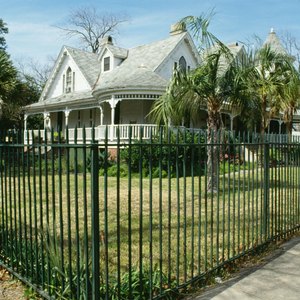
Fences built on certain types of property may qualify as depreciating deductions. Fences built on non-rental residential property cannot be deducted, but do add to the home's "tax basis" for a tax break when the home is sold in the future.
Fences built on rental property or for agricultural purposes can be deducted on a depreciating basis. The depreciation schedule for agricultural fences is seven years, but the depreciation schedule for fences on rental property is 15 or 20 years, depending on the depreciation system used. For all other for-profit businesses, fences do not qualify as depreciating assets.
Fence Deductions for Personal Residences
You cannot deduct the cost of a fence built on your personal property, but you can still get a tax break if certain conditions are met. First and foremost, the fence must be considered a "home improvement" rather than a home repair. IRS Publication 530 states that home improvements add to the house's material value, whereas home repairs simply maintain its current condition. Most new fence installations should qualify as home improvements.
If your fence is considered a home improvement, add up the cost of materials and services related to the fence. Land surveys, equipment rental and professional labor are all applicable costs. If you install the fence yourself, you cannot count your own labor as a cost.
Keep a record of all those costs and add it to your home's "tax basis." This is the purchase price of the home and the cost of all improvements. When you sell your home, the tax basis is subtracted from the sale price. The leftover amount is what you'll pay taxes on, so keeping an accurate record of all home improvements will prove beneficial in the long run.
Fence Deductions for Rental Properties
You can deduct the depreciated cost of home improvements – including fences – on your taxes each year if the home is rented out. You can only deduct these home improvements if you're the landlord, not if you're the renter. According to IRS Publication 527, fences are given a depreciation life of 15 years under the General Depreciation System or 20 years under the Alternative Depreciation System.
A fence can be depreciated using the straight-line calculation. This method allows the same amount to be deducted each year because the asset value doesn't dramatically decline. The other depreciation method – called a declining balance – will result in a high initial deduction and then a steady decline in depreciation value over the next 15 years.
Consult with your tax adviser about which depreciation calculation makes the most sense for your situation, as there are pros and cons to both.
Fence Deductions for Agricultural Businesses
According to IRS Publication 225, most businesses cannot deduct the depreciated cost of fences from their taxes. That's because fences are considered "land improvements" and do not qualify as depreciable property under Section 179. Land itself is also not considered depreciable property.
Agricultural fences are an exception, however. According to IRS Publication 946, the depreciation of agricultural fences must be calculated using the General Depreciation System, not the Alternative Depreciation System. Fences installed after 2017 have a depreciation life of seven years. The depreciation of agricultural fences can be calculated using either the declining balance or straight-line method.
If you lease your land to someone else for agricultural purposes, consult with your tax adviser about qualifying depreciations.
References
Writer Bio
Cathy has been writing about finance since 2014 and has been published on sites like The Nest, Bizfluent, Financial Independence Hub, and Credibly. She takes a particular interest in demystifying personal finance questions, like budgeting, tackling debt, and investing for the future.
